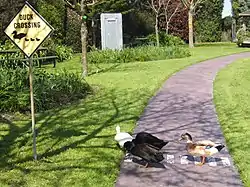Ngatea
Ngatea (Māori: Ngātea) is a small town on the Hauraki Plains in the North Island of New Zealand. It is located 18 kilometres southwest of Thames and 70 kilometres southeast of Auckland. Ngatea lies on the Piako River, eight kilometres south of its outflow into the Firth of Thames.[3]
Ngatea | |
|---|---|
 | |
| Coordinates: 37°17′S 175°30′E | |
| Country | New Zealand |
| Region | Waikato region |
| District | Hauraki District |
| Ward | Plains Ward |
| Electorates | |
| Government | |
| • Territorial Authority | Hauraki District Council |
| • Regional council | Waikato Regional Council |
| Area | |
| • Total | 3.35 km2 (1.29 sq mi) |
| Population (June 2023)[2] | |
| • Total | 1,610 |
| • Density | 480/km2 (1,200/sq mi) |
Ngatea is the 'service centre' for the farming area of the Hauraki Plains. It was established in the 1900s as a result of a unique series of canals and stop banks which drained the land and produced rich farmlands for dairy production.[4]
The town also acts as a service town for motorists travelling from Auckland to the Coromandel Peninsula and Bay of Plenty via State Highway 2.[4]
Demographics
Ngatea covers 3.35 km2 (1.29 sq mi)[1] and had an estimated population of 1,620 as of June 2022,[5] with a population density of 484 people per km2.
| Year | Pop. | ±% p.a. |
|---|---|---|
| 2006 | 1,182 | — |
| 2013 | 1,269 | +1.02% |
| 2018 | 1,452 | +2.73% |
| Source: [6] | ||
Ngatea had a population of 1,452 at the 2018 New Zealand census, an increase of 183 people (14.4%) since the 2013 census, and an increase of 270 people (22.8%) since the 2006 census. There were 576 households, comprising 699 males and 750 females, giving a sex ratio of 0.93 males per female. The median age was 46.1 years (compared with 37.4 years nationally), with 282 people (19.4%) aged under 15 years, 228 (15.7%) aged 15 to 29, 564 (38.8%) aged 30 to 64, and 381 (26.2%) aged 65 or older.
Ethnicities were 89.5% European/Pākehā, 16.1% Māori, 1.4% Pacific peoples, 3.1% Asian, and 1.2% other ethnicities. People may identify with more than one ethnicity.
The percentage of people born overseas was 13.4, compared with 27.1% nationally.
Although some people chose not to answer the census's question about religious affiliation, 54.8% had no religion, 32.2% were Christian, 1.2% had Māori religious beliefs, 0.4% were Hindu, 0.4% were Muslim, 0.4% were Buddhist and 1.9% had other religions.
Of those at least 15 years old, 138 (11.8%) people had a bachelor's or higher degree, and 312 (26.7%) people had no formal qualifications. The median income was $28,800, compared with $31,800 nationally. 168 people (14.4%) earned over $70,000 compared to 17.2% nationally. The employment status of those at least 15 was that 534 (45.6%) people were employed full-time, 138 (11.8%) were part-time, and 27 (2.3%) were unemployed.[6]
Education
Ngatea has two schools:
- Ngatea Primary School is a co-educational state primary school,[7][8] with a roll of 308 as of April 2023.[9][10] The school opened in 1960.[11]
- Hauraki Plains College is a co-educational state secondary school,[12][13] with a roll of 862 as of April 2023.[9][14] In 1912, the school was first opened and called Orchard School, with a roll of 15 students. In 1923 its name was changed to Ngatea District High School. The Government attempted to close the school amid declining attendance, however this was unsuccessful due to unprecedented community support. In 1963, the name was once again changed to Hauraki Plains College.
References
- "ArcGIS Web Application". statsnz.maps.arcgis.com. Retrieved 4 September 2022.
- "Subnational population estimates (RC, SA2), by age and sex, at 30 June 1996-2023 (2023 boundaries)". Statistics New Zealand. Retrieved 25 October 2023. (regional councils); "Subnational population estimates (TA, SA2), by age and sex, at 30 June 1996-2023 (2023 boundaries)". Statistics New Zealand. Retrieved 25 October 2023. (territorial authorities); "Subnational population estimates (urban rural), by age and sex, at 30 June 1996-2023 (2023 boundaries)". Statistics New Zealand. Retrieved 25 October 2023. (urban areas)
- Hariss, Gavin. "Ngatea, Waikato". topomap.co.nz. NZ Topo Map.
- "Ngatea Travel Guide". Jasons Travel Media.
- "Population estimate tables - NZ.Stat". Statistics New Zealand. Retrieved 25 October 2022.
- "Statistical area 1 dataset for 2018 Census". Statistics New Zealand. March 2020. Ngatea (168900). 2018 Census place summary: Ngatea
- "Official School Website". ngateaprimary.com.
- Education Counts: Ngatea School
- "New Zealand Schools Directory". New Zealand Ministry of Education. Retrieved 12 December 2022.
- "Education Review Office Report". ero.govt.nz. Education Review Office.
- "Ngatea Primary School History". Ngatea School. Retrieved 4 October 2020.
- "Official School Website". haurakiplains.school.nz.
- Education Counts: Hauraki Plains College
- "Education Review Office Report". ero.govt.nz. Education Review Office.